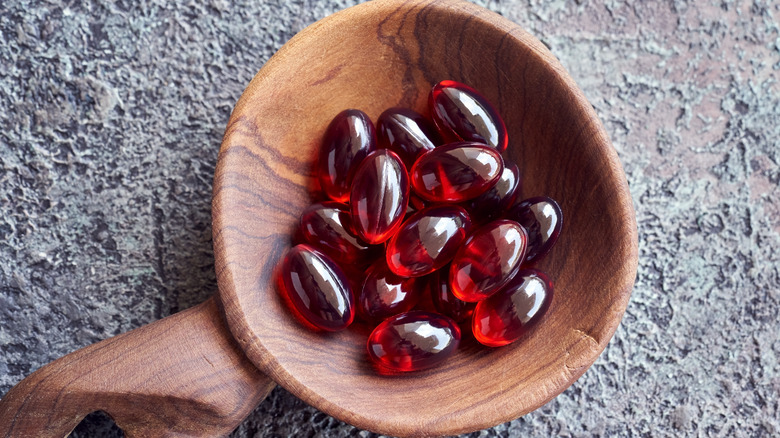What Is Krill Oil And Why You Should Be Taking It
Most experts recommend a diet rich in omega-3 essential fatty acids, among other key nutrients. These fats include docosahexaenoic acid (DHA), eicosapentaenoic acid (EPA), and alpha-linolenic acid (ALA), with the latter being derived from plants (via Mayo Clinic). The Mayo Clinic also notes that fish oil, one of the best dietary sources of omega-3s, may protect against heart disease, reduce inflammation, and improve blood lipids. Over time, it may also ease arthritis pain and cause modest reductions in blood pressure. But as it turns out, krill oil is an even better source of omega-3 fatty acids.
Clinical evidence published in Lipids in Health and Disease suggests that krill oil might be more effective than fish oil at improving omega-3 levels in healthy people. Simply put, the DHA and EPA in krill oil are more bioavailable, or better absorbed by the body. Moreover, subjects who took krill oil experienced no side effects other than burping and aftertaste.
This dietary supplement also contains choline, an essential nutrient that supports cell function, reports a 2019 study featured in the journal Nutrients. Researchers say that about 90% of Americans are not getting enough choline, which may put them at risk for memory problems, impaired brain function, fatigue, and cardiovascular problems. But what is krill oil in the first place and how does it benefit your health?
Krill oil might be a viable alternative to fish oil
Krill oil is an omega-3 supplement produced from Antarctic krill, a small crustacean found in the ocean. Just like fish oil, it boasts large amounts of omega-3s and may improve blood lipids, including triglycerides and cholesterol levels, suggests a 2015 review published in Vascular Health and Risk Management. According to a 2018 review published in Nutrients, astaxanthin, an antioxidant in krill oil, may help support immune function, skin health, and DNA repair. Additionally, per the Nutrients review, krill oil may cause a greater increase in plasma DHA and EPA concentrations compared to fish oil.
This dietary supplement may improve cardiovascular health markers, but findings are mixed, according to 2014 research published in Hospital Pharmacy. Some studies indicate that it lowers total and LDL (the "bad") cholesterol levels, while others show little or no benefit. In a 2016 clinical trial, krill oil reduced knee pain and stiffness in as little as 30 days, reports PLOS One. Research published in Alternative Medicine Reviews also suggests that it may ease the symptoms of premenstrual syndrome to a greater extent than fish oil.
Note that krill oil is a relatively new product, so more studies are needed to confirm its benefits. Most of the research carried out so far has focused on omega-3s or fish oil. However, scientists agree that krill is a good source of heart-healthy fats, astaxanthin, and choline. As far as dosage goes, the recommended daily intake of omega-3s is 1.1 grams for women and 1.6 grams for men, according to the National Institutes of Health.


